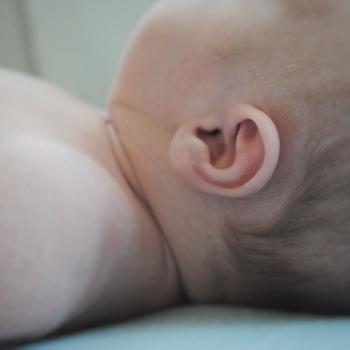
The sign said “7200 Family Waiting,” but it might as well have read, “Abandon all hope, ye who enter here.” It was the kind of place that could lead one to conclude that hell and hospitals have the same interior decorator. There were only a few empty chairs in the room as the families who stayed in the room to care for their loved ones were many. There were stains from spilled drinks on the floor and empty coffee cups on the tables. The fluorescent lights were somehow dim, which made the room feel uncomfortable. The room was warm and stuffy. It felt like a human petri dish. The pressure of knowing that a loved one’s life was hanging in the balance made the room feel oppressive. Some families had arranged the chairs so they could stretch out their legs and get some sleep, although comfort was in short supply. In 7200 Family Waiting, families’ only comfort was in information.
(*I seldom write about Jenni because even ten years after her loss, it is too close to the surface. I have decided, however, that to do what I am called to do requires that I let people know why I think and write the way I do. That means I have to talk about losing Jenni and the consequences in my life. I have spent the better part of the last decade thinking and praying about the problem of evil. I believe I am called to be a guide for those who have suffered loss, and I want my writing can serve and a source of hope. I want to point all who have suffered an illness, the loss of a loved one, who have buried a child or a spouse to find hope in the One who is goodness itself. The next several articles will describe my journey from darkness to healing.)
Information, was in short supply, however. The doctors did their rounds without the families in their loved one’s room. So, the families had to rely on summaries by nurses or finding the doctors later in the day for conferences. At times, waiting in the dirty, stuffy, warm, crowded room was intolerable. The only escape from the oppression was to step outside of the room for air.
That is where I saw Josh. He was leaning on the door frame talking to his mother. His over-six-foot frame towered over her as they spoke. He was wearing khaki cargo pants and his standard University of North Carolina t-shirt, a brave choice at Duke University Medical Center. Although he was young, in his mid-twenties, he looked haggard. He had not shaven in many days, and the weight of what was occurring pressed down on his shoulders. He could barely lift his head.
What I have come to know is that his haggard face was the face of courage. I had learned to have a deep respect for Josh. The first time I met Josh was at a family Thanksgiving celebration. He had come from college with my sister Jenni and apparently they were a “thing.” Being introduced as a boyfriend to the family is always unnerving, but Josh handled the situation with class. We all liked Josh immediately. It was not long after that, the following Christmas as I recall, that Jenni brought home something else with Josh, sickness. Jenni came home with a terrible raspy voice. We all thought it was mono, something that runs rampant on college campuses. We insisted that she go to the doctor, she agreed, reluctantly. When the doctor took a chest x-ray of Jenni, his demeanor changed. He immediately wanted to talk to dad. After getting Dad there, he announced the diagnosis. Jenni did not have mono, she had lymphoma.
There is no news worse than hearing that your loved one has cancer. It terrified the entire family. One could expect that this might have been too heavy for a college kid like Josh. And one would be wrong. Josh stood by Jenni. Her course of treatment was chemotherapy and radiation, and with him by her side, she handled it beautifully. She even made a 4.0 while undergoing chemotherapy. I was impressed with both of them.
On the day that Jenni and Josh were married, we knew that the lymphoma had returned. As I pronounced them husband and wife, I was terrified at Jenni’s prospects for recovery. Like before, though, Josh was with her. He bore the ravages of her cancer, chemotherapy, radiation, and nausea with great grace. We loved him for it.
After the second bout with cancer, Jenni seemed to be doing quite well. The family breathed a sigh of relief, at least for a while. When Jenni was at my daughter’s birthday party the following October, I noticed something odd. One of her toes was in a spasm. It was curled up unnaturally. I suggested that she go to the doctor immediately. She did. What she discovered was terrible. The radiation and chemotherapy that had saved Jenni’s life caused a major complication. In about 5% of people who have Hodgkin’s disease, radiation and chemotherapy cause leukemia. Jenni was among the 5%.
The treatment for Jenni’s leukemia a stem cell transplant. Among her siblings, I was the closest match. So, I gladly donated the stem cells. After weeks in the hospital and clinics at Duke, Jenni went home. The transplant was successful.
During the weeks and months that followed, Jenni’s progress went well. She was able to live a normal life, although, with a stem-cell transplant, no life is really normal. In March of 2009, Jenni entered Duke University Medical Center to deal with some complications. She had developed graft versus host symptoms in her eyes and mouth. She had developed Diffuse Alveolar Hemorrhaging in her lungs. Thrombotic Thrombocytopenic Purpura was ravaging her blood, and the doctors seemed to believe that this last problem was the source of her other issues.
When I arrived at the hospital, Josh struggled to say that the doctors were putting Jenni on a ventilator. They were unsure if she would ever be able to come off of it, but she could not survive without it.
As I looked at Josh while he leaned on the door frame, I thought that no person this young should have to go through this. He was a kid. He was barely out of college. He had been married only a few years. Where would he find the mental and emotional reserve to cope with the unfolding events? At any rate, I was there now, and I committed that I would do anything to help my sister and anything to help him.











